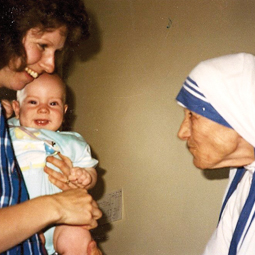The Bad Company Jesus Keeps — and the Lives Changed by His Forgiveness
User's Guide to Sunday, June 16

Sunday, June 16, is the 11th Sunday in Ordinary Time (Year C, Cycle I).
Father’s Day
There’s a great Father’s Day movie out on DVD, but there are only two problems. First, it’s inappropriate for kids; second, many fathers don’t want to see it. The new Les Miserables movie is much more watchable, however, if you skip the song Master of the House. And the story of Jean Valjean’s fatherly care for Cossette, the daughter of a prostitute to whom he is unrelated, is a beautiful example of the virtues of Christian fatherhood. He is a protector, provider and religious guide to the girl, and he eventually even learns how to let her go.
Readings
2 Samuel 12:7-10, 13; Psalm 32:1-2, 5, 7, 11; Galatians 2:16, 19-21; Luke 7:36-8:3 or 7:36-50
Our Take
Jesus keeps bad company.
That’s the lesson of today’s readings — all of them.
The most obvious bad company he keeps is in the Gospel, when he allows a repentant prostitute to touch him. Visiting the home of a Pharisee, he accepts her extravagant show of affection for him, causing his hosts to raise their eyebrows and one to think, “If this man were a prophet, he would know who and what sort of woman this is who is touching him, that she is a sinner.”
But the first reading also shows the bad company Jesus keeps. It refers to the sordid story of David and how he stole the wife of Uriah by sending her husband to his doom. There is a place in Jesus’ story we hear about this. At the beginning of the Gospel of St. Matthew, we learn the genealogy of Jesus, which includes, “And David was the father of Solomon by the wife of Uriah …” The story of David’s sin is also the story of Jesus’ family.
In addition to the prostitute and the murderous adulterer, there is one other story of the bad company Jesus keeps. In the Book of Galatians, before today’s second reading starts, Paul points out how he “persecuted the Church of God violently and tried to destroy it.” Paul was a zealous follower of the Law willing to kill Christians, but he was converted and now declares, “I live; no longer I, but Christ lives in me.”
The readings are all about the bad company Jesus keeps because they are about the one thing that makes it possible for him to do so: forgiveness.
“The Lord on his part has forgiven your sin: You shall not die,” the prophet tells David, the adulterer.
St. Paul reflects on “the Son of God who has loved me and given himself up for me.”
And Jesus says about the prostitute: “Her many sins have been forgiven because she has shown great love.”
Which brings us to the other bad company Jesus is keeping, even now: us.
Though we are sinners, too, he comes to our table in the Mass, and he invites us to his table in heaven.
“Jesus invites sinners to the table of the Kingdom,” says the Catechism of the Catholic Church. He came “‘not to call the righteous, but sinners.’ He invites them to that conversion without which one cannot enter the Kingdom, but shows them in word and deed his Father’s boundless mercy.”
When Jesus forgave the prostitute, she responded by loving him more than the religious leaders of her time. When God forgave David, he responded by becoming a great hero for God. When Jesus forgave Saul, the scourge of Christians, he responded by becoming a great saint.
What will we do in response to God’s forgiveness of us?
Tom and April Hoopes write from Atchison, Kansas,
where Tom is writer in residence at Benedictine College.
- Keywords:
- June 16-29, 2013

















